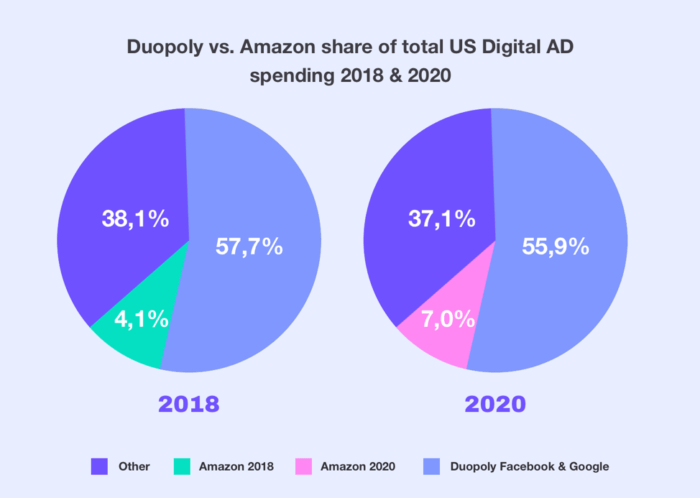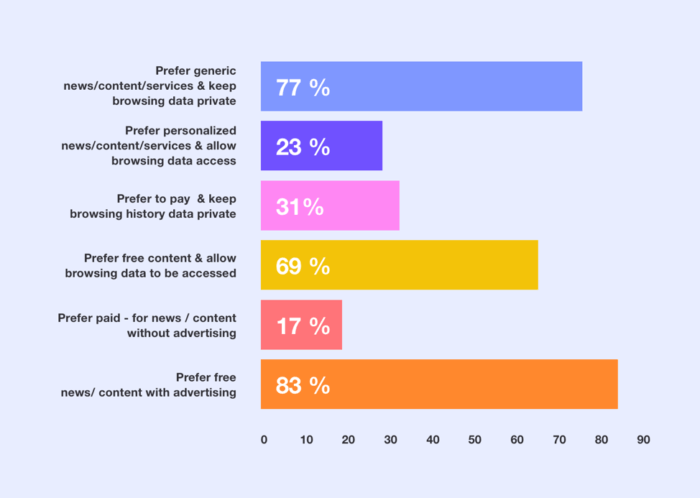Will smaller ad agencies end up ultimately trampled to death by yottabytes of Facebook and Google data?
Along with being reigning leaders of the tech industry, Google and Facebook run the most prominent advertising networks. The rest of the no-names pale into insignificance compared to the great and terrible Duopoly. Will smaller ad agencies end up ultimately trampled to death by yottabytes of Facebook & Google data?
"Who owns the information, he owns the world." This 300-year old quotation is more relevant today than ever. Like it or not, it is personal data and its quality that defines the success of advertising campaigns. Get the right data about the customer and this customer is likely yours.
Facebook and Google grew from unicorns into giant datavorous raptors that absorb all info about their users. No wonder they account for a combined 60% share of digital advertising in 2019. While such data greediness is wreaking mistrust among regular folks, small and big beasts of business take advantage of this data superiority, choosing Google and Facebook as major inventory suppliers for their ad campaigns.
Ad agencies, which formed the backbone of the advertising niche a decade ago, are now staying on the sidelines. Their revenues are going south while their data collecting methods can't hold a candle to the duopoly’s powerhouses.
Is there any chance of survival? Will ad agencies take their last breath in the next ten years, with Google, Facebook, and Amazon’s share increasing to 99%? While the hope is still smoldering, it's time to figure out a plan B for ad agencies to strike back and claim their place in the sun.
Behind the curtain: how Facebook and Google collect user data?
Although Facebook's and Google's advertising algorithms are locked in the blackest box ever, the general principle of their data collection is quite apparent.
Facebook's mechanisms of data devouring
Signing up to Facebook, you immediately lose the inviolability of your private information. Most of the users voluntarily hand plenty of data attributes like gender, age, place of work and study, interests, etc. to the network during their first day on the website.
But the most fun fact about Facebook is that it collects data even if you don't have a Facebook account. The network uses two ways to retrieve data from non-registered users: browsing history and their friends.
Google's secrets of data richness
The primary source of Google's data is search. Each time you type letters in the search line, Google is taking notes and later personalizes your search accordingly.
Aside from search, you may use at least one Google service or have a Google account, which is very likely, as even YouTube belongs to Google. The search engine tracks link clicks, forms fills, server requests, and embeds small JavaScript code into almost any of the websites to understand a person's browsing habits even better.
Google knows that you traveled to Cambodia last fall, that you like bacon and eggs for breakfast, and that you have already finished the latest episode of Stranger Things ahead of your partner. Your partner may never discover the truth, but this guilty pleasure can't get past Google.
Drawbacks of duopoly's data collection practices
The duopoly willingly allows "using" their data to market goods & services, and so advertisers are happy. But does it benefit regular users like you and me when we're off the clock? Not at all.
Kate O'Flaherty said it perfectly in her recent Forbes article published after another Facebook data breach that affected 50 million of its users. "Trust in large technology companies is at an all-time low" — writes Kate. Facebook and Google may not resell their data to other parties, but even they are not safe from the risk of the data breach.
That’s not the first data breach that occurred on Facebook. A year before, Cambridge Analytica harvested personal data of over 87 million Facebook users without their consent. In the same year, Google exposed private data of 500,000 users. Instead of alerting users about the incident right away, the company waited for seven months to disclose the breach to the audience.
This was not the last event that happened within a year. Later in 2018, Google revealed a Google+ bug that left the user's age, occupation, and email address exposed for six days. Again, the representatives had been covering up the incident for one month.
The reason for that is obvious: Google is afraid of hurting its public image, and so should you be while working with their ad platforms.
I would never debate on the effectiveness of personalization, especially as 77% of the people surveyed in this study conducted by the research firm GfK in collab with IAB Europe didn't prefer generic content, services, and ads. On top of this, 65% of users would never opt-in to personal tracking across the web for advertising.
Facebook and Google never kept their tracking activities from us; it's all nicely written in their privacy policies. However, users provide data to the duopoly not because they wish to see better ads but to have a better social experience or customization within GSuite apps. That's why super-precise targeting on the person's interests that nobody but Google knows can hurt your company image. People don't want to be stalked by brands, even by the best ones.
What about ad agencies: Do they use a data-driven approach in their media-buying practices?
They do. It's impossible to ignore data completely when "data-driven" is such a buzzword. But when giant networks like Google AdSense resemble huge oil-processing factories, small agencies are like gas stations that use small chunks of data already refined for them.
Ad agencies primarily rely on ad tech companies in their media buying activities. Most of them utilize ad networks and self-serve DSPs, which create some challenges on the way to better data processing within a company. They gather some data about their clients, yet their hands are tied when it comes to third-party sources.
No enterprise will share their data for free with another business, even if it's not their direct competition. Therefore, ad agencies that don't have their ad technology in-house stack might collapse in the face of the Duopoly.
3 ways to strengthen ad agencies with smarter big data solutions
At the same time, ad agencies don't need each user's "mental health record" as such from Facebook's file cabinet. Though, they could benefit from collecting better and more detailed third-party data by establishing a stable data source. This source may be their own ad tech platform that directly gathers third-party data and immediately brings it to the ad agency's servers.
Welcome the three ad tech solutions that can serve as a lifeline for each of the drowning agencies.
1. White-label demand-side platform
Ad agencies and ad networks often utilize programmatic solutions, most often a self-serve DSP (demand-side platform). It's the best tool on the market for individual advertisers who want to enhance their digital media buying, but it's not that rosy for agencies, which handle budgets of over $50,000 per month.
First of all, self-serve DSP providers are intermediaries who charge you up to 50% of a hidden fee, which translates into a significant bid markup. This can be avoided by setting up your own platform based on white label DSP technology.
Second, the lack of transparency is a major reason why advertisers move on to self-serve solutions. But if the ad agency uses a self-serve platform itself, there is no possibility of creating an advertiser's account and giving them transparent access to their campaigns.
White-label DSP adoption can give you a competitive edge on agencies since most of them don't show how the ad campaign is going to their customers. With a WL DSP, ad agencies can give out personal accounts to advertisers and vividly demonstrate how their campaigns perform in real-time. The opportunity to check on campaigns anywhere anytime can retain them.
A self-serve DSP provider is just another company with its own interests. Even though it shares some data with you, you will never see all of it. For full transparency and control, ad agencies might opt for a white-label DSP solution, where they buy the technology and build up the platform based on it.
Some white-label DSPs offer a precious feature of bidstream data collection. Bidstream is data about the user who has just seen an ad on the publisher's website and can contain up to 50 attributes per user. This is not personally identifiable information, and you don't violate GDPR by its collection, but it can make a good use for user profiling, location identification, and ad spend optimization.
Summing up, an ad agency equipped with a white label DSP can utilize big data without infringing upon their privacy, as the person's name and private details remain undisclosed.
2. Data management platform
The data management platform (DMP) gathers and consolidates data retrieved from all sources. This data is anonymous, just like bidstream data explained above. Data collected by a DMP has an expiration date: it's stored up to 90 days, which is the lifetime of a cookie. The platform can build temporary user profiles without specifying their names, but the connections between them remain probabilistic.
Modern-day DMPs integrate with major DSPs, SSPs (supply-side platforms), and ad networks, making them more sophisticated in terms of targeting and media planning. Ad agencies can connect a DMP to their current programmatic tool to take their data-driven advertising to the next level.
3. In-house business intelligence tools
Business intelligence (BI) tools specialize in collecting historical data about the company as well as data from external sources and transforming it into actionable insights. The primary purpose of BI is to streamline business operations and fuel the data-driven decisions of the company.
Data collection is not the only ability of BI, because if it was, it would be the same thing as a DMP. BI can either analyze, visualize, or report on the received information, and even suggest a change to the business strategy afterward.
In advertising, BI contributes to the crafting of an ideal audience behavior pattern for a particular company. Utilizing business intelligence, advertising agencies are able to dig deeper into the company's history and obtain another edge over the Duopoly, which treats each client from scratch and all the same.
The bottom line: small agencies offer much more than just data
Advertising data is an obsessive concern of agencies, networks, and advertising specialists. The small business perspective is different. Massive datasets are not what they want to deal with or even be aware of. Their primary goal is to find a good ad network or platform that brings consistent results.
Google and Facebook can boast of superior data solutions, but there is one thing they'll lack forever: human resources which become luxury when everyone is striving for automation.
Facebook Ads Manager and Google Ads are soulless algorithms, using these means you're left one-on-one with a shadow machine. You have an instruction manual, but no timely human help will ever be provided.
By contrast, ad agencies are replete with human resources. Here you stop being another generic sign-up and become who you really are: the unique business with a unique strategy. They take your hand and solve the tricky advertising conundrum with you, treating you as an equal partner. They not only drive impressions to your website but also explain why your campaign is running poorly and how exactly you can make it better.
Human resources, not data issues, is the primary reason why supportless self-serve Duopoly platforms will never take over the advertising market.
Kateryna Novatska is a digital marketing & advertising specialist who develops content, lead generation, and user acquisition strategies for B2B companies. She has a 3-year expertise in programmatic advertising and hands-on experience with 5+ ad tech platforms. Contact her via
LinkedIn.







